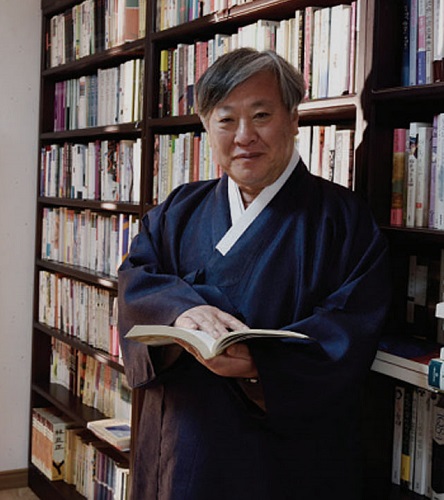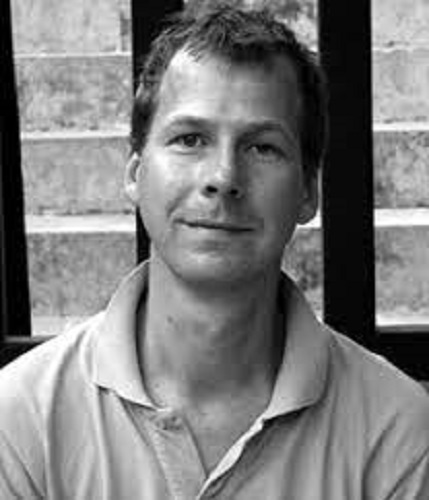De Zuidkoreaanse schrijver Yi Mun-yol werd geboren op 18 mei 1948 in Yongyang. Zie ook alle tags voor Yi Mun-yol op dit blog.
Uit: Meeting with My Brother (Vertaald door Heinz Insu Fenkl en Yoosup Chang)
“Come in,” a woman’s voice called from the shadows be-hind the counter. I couldn’t be sure from her short greeting, but she didn’t seem to have the local Yanji accent. She came over to me as I found an empty table. She appeared to be around thirty. “What would you like?” When she handed me a menu and asked again what I’d like, her accent sounded so much like the Seoul dialect that I did a double take. She was dressed the way a proprietor of a cafe in Seoul would dress, and for a moment I wondered if she was from there, but then decided against it. I’d heard that people from the South were starting lots of businesses here in Yanji, but why bother opening a second-rate café? I couldn’t imag-ine a woman from Seoul coming all the way to Yanji to be a hostess. “I’ll just have a glass of juice,” I said. I was curious about her, so I tried a ploy I used when I wanted to chat with pro-prietresses of country cafes in the South. “Bring one for yourself, too, if you like.” The woman returned with two glasses of juice—she was obviously used to this sort of thing—and sat down with me. She might have been bored, since there were no other custom-ers, or else her lack of self-consciousness meant she wasn’t a local. She spoke first. “You’re not from around here,” she said with exaggerated interest. “Where did you come from?” I suppressed my curiosity about her for the moment. “I’m from Seoul; I said. “Are you here alone?”
“No, I’m with a group. But I broke away to take care of some business.” “Are you a businessman?” “Not really, I’m just meeting someone.” “Where’s the rest of your group?” “It’s just a tour group. They’re at I leaven Lake.” “When do they get back?” I figured there was no reason to hide anything from her, so I told her the truth. “Tomorrow night. We’re supposed to stay in the hotel together.” “Then bring them here tomorrow night,” she said with a knowing look. “I’ll take good care of you all. It may not be much, but we have karaoke here. And a lot of irresistibly beautiful girls, real killers.” “I’ll tell them,” I said. I had finally found an opening, so I asked her, casually, “Are you from here?” She answered without much hesitation. “Yes. Not exactly Yanji, but I grew up nearby. Why? Don’t I look like a local?” “You don’t sound like it. Have you ever been to Seoul?” “Oh, my accent! Yes, I lived in Seoul for about two years. I got funny looks and there were a lot of other disadvantages, too, when people heard my accent so … I worked hard on a Seoul accent. Does it sound pretty close?” “What do you mean by disadvantages of having a Yanji accent?” “Once they find out you’re from Yanji, they look down on you and try to cheat you. And when I had a job they’d try to grope me while I was working.” She must have gone to Seoul to make some money.”

De Duitse dichter en schrijver Markus Breidenich werd geboren in Düren op 18 mei 1972. Zie ook alle tags voor Markus Breidenich op dit blog.
Cold Play
Soms kan men
van deze werkbespreking in de sneeuw
een geknerp opvangen.
Alsof het de toon van vlokken is, die hier
de stemming dicteert.
De gedempte nadering van een kraai
op de takken van een blauwe spar.
Of het luwen van de sneeuwjacht
hiernaast.
In de voorbewerkte groeven kon je
de naald van een spar horen vallen
voor het aftasten van opgenomen tracks.
Zoals
die het knisperen van het ijs weergeeft.
Onder de voeten.
Vertaald door Frans Roumen

Zie voor nog meer schrijvers van de 18e mei ook mijn blog van 18 mei 2020 en eveneens mijn blog van 18 mei 2019 en ook mijn blog van 18 mei 2018 en eveneens mijn blog van 18 mei 2014 deel 2.
